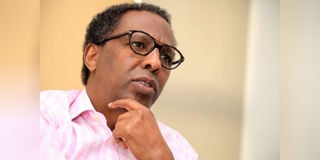Judges: High Court has no power to hear petition on Ahmednasir Abdullahi ban

Lawyer Ahmednasir Abdullahi.
Supreme Court judges want a case filed by the Law Society of Kenya (LSK) challenging the decision barring Senior Counsel Ahmednasir Abdullahi from appearing before them dismissed, arguing that the High Court has no power to deal with the matter.
Appearing before Justice Chacha Mwita on Monday morning, the Supreme Court judges asked for time to file the objection, against the petition lodged by the LSK.
The LSK moved to the High Court last week, arguing that the decision to bar Mr Abdullahi and his associates from appearing before the Supreme Court goes against the rules of natural justice since the lawyers were not given an opportunity to be heard despite the seriousness of the decision.
But through Senior Counsel Kamau Karori and James Ochieng’ Oduol, the Supreme Court judges led by Chief Justice Martha Koome said they will be asking the court to strike out the petition.
“Jurisdiction is everything. Without jurisdiction, the petition cannot stand and the issues raised in it cannot be addressed,” Mr Oduol submitted.
Justice Mwita directed the parties to appear before him on February 26, for directions and to confirm whether the Supreme Court judges will have filed the application.
The apex court on January 18 sent a letter addressed to Mr Abdullahi stating that together with employees of his law firm, persons holding his brief or acting on his instructions will not be granted audience over his persistent attacks against the leadership and judges of the court.
The judges made good their threat a few days later when six judges recused themselves from hearing a case before them, as one of the respondents was represented by Mr Abdullahi.
The LSK says the decision is unconstitutional, unreasonable and contrary to the statute. The lawyers’ body has sued the Supreme Court and named all the judges and the deputy registrar of the court as interested parties in the case.





